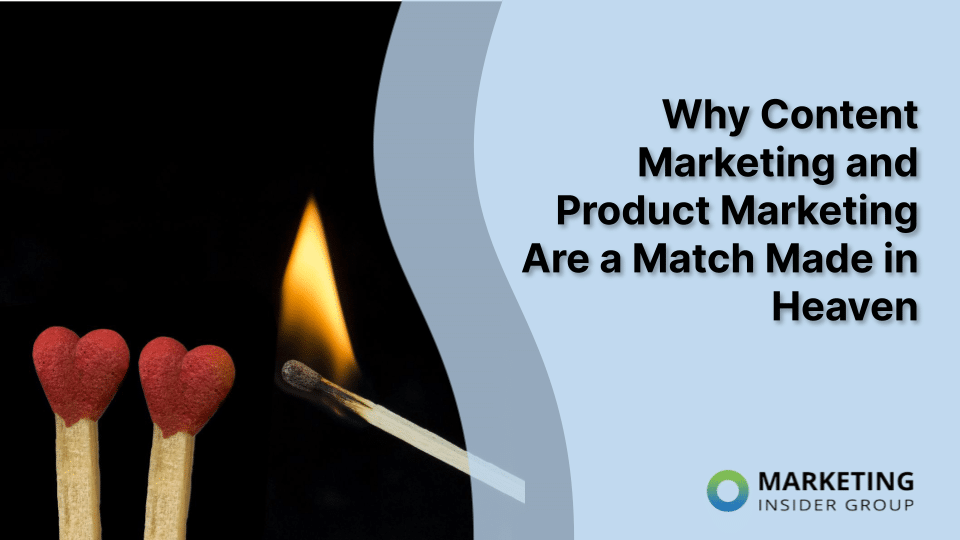
Why Content Marketing and Product Marketing Are a Match Made in Heaven
Marketing has always been centered around attracting and retaining customers to fuel our business growth.
In yesteryears, we leaned heavily on traditional product-centric marketing strategies. We’d proudly showcase our product’s brilliance, defend its price point, and guide buyers to its purchase location.
However, the rise of the digital age, with its social platforms and mobile connectivity, has shaken things up. Today, we’re navigating a sea of content, advertisements, and yes, even those irresistible cat videos, all vying for our audience’s attention.
So, does this shift mean we should ditch product marketing in favor of content marketing? Not quite. The sweet spot is a blend of both. Indeed, content marketing and product marketing together form a harmonious duo. Let’s explore why this is the case.
Quick Takeaways
- Content marketing crafts valuable content that educates, entertains, and connects, fostering trust and authority.
- Product marketing ensures the audience recognizes a product’s value, emphasizing its features, benefits, and problem-solving capabilities.
- Content and product marketing, while distinct, complement each other to guide customers throughout their buying journey.
- Prioritizing customer-centric approaches in marketing leads to success in today’s competitive landscape.
What Is Content Marketing?
Content marketing is like telling a story, but for your brand. It’s not about pushing your products or services aggressively. Instead, it’s about creating valuable, relevant content that your audience genuinely wants to consume. Think of it as a conversation between you (the brand) and your audience (the customers).
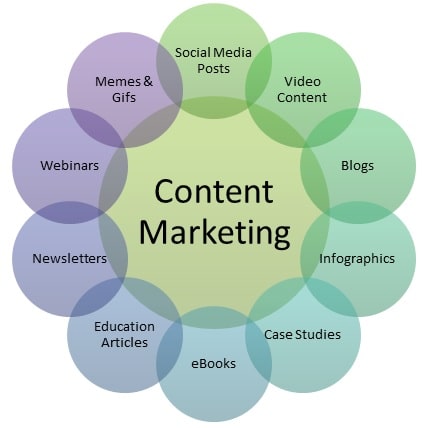
Image Source: MBA Skool
Why do we do it? Simple. We want to:
- Build trust
- Foster relationships
- Establish authority
When you share insightful articles, engaging videos, or even fun infographics, you’re not just selling, but rather educating, entertaining, and connecting. And guess what? People love brands they can relate to and trust.
What Is Product Marketing?
Product marketing is the bridge between creating a product and getting it to its audience. It’s your job to make sure that the right people know about your product, understand its value, and see how it fits into their lives.
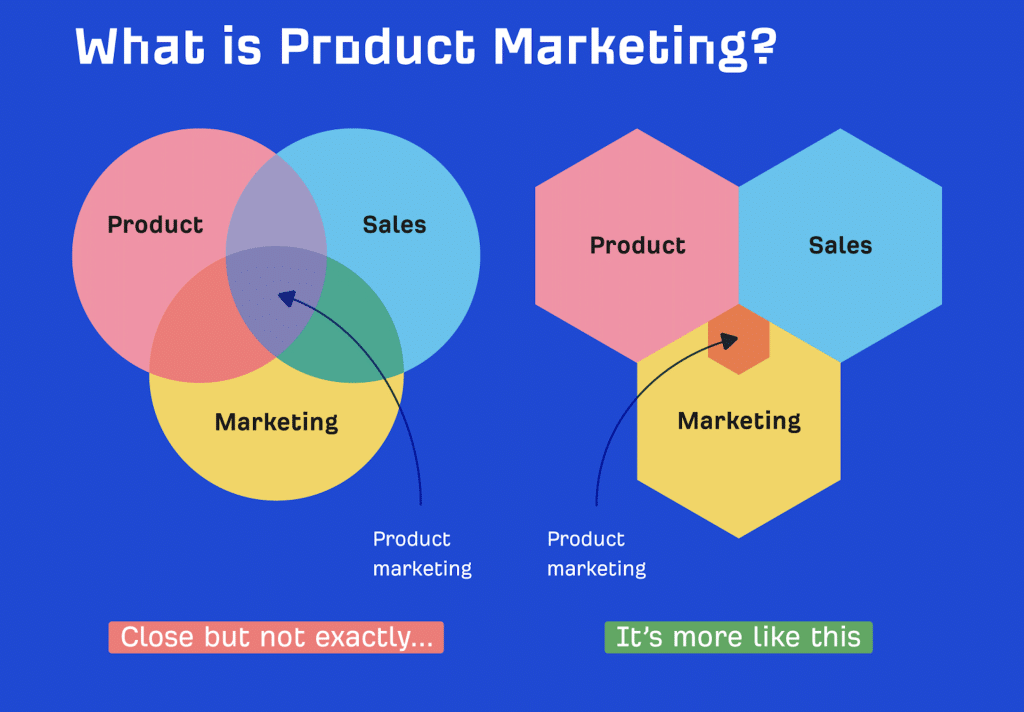
Image Source: Ahrefs
Now, you might wonder, “Isn’t that just regular marketing?” Not quite. While traditional marketing focuses on the broader brand message, product marketing hones in on:
- Specific product features
- Benefits
- The problems it solves
It’s about positioning your product in the market, pricing it right, and launching it with a bang.
In essence, product marketing is your product’s storyteller. It highlights your product’s strengths, addresses potential concerns, and showcases how it stands out from the crowd. And when done right, it doesn’t just lead to sales, but also creates loyal customers who can’t wait to share their newfound gem with others.
What’s the Difference: Content Marketing vs Product Marketing
Do content marketers and product marketers operate on different sides of the marketing aisle?
Remember, product marketing encompasses all the positioning and messaging needed to launch a product with the goal of ensuring that those selling it and the market it’s intended for truly understand it. Product marketing’s goal is to drive demand for a product through a detailed explanation of how the product solves the problem.
Content marketing uses relevant, interesting content to attract an audience. It’s centered around being informative and leading buyers to the conclusion that the brand can solve their challenges.
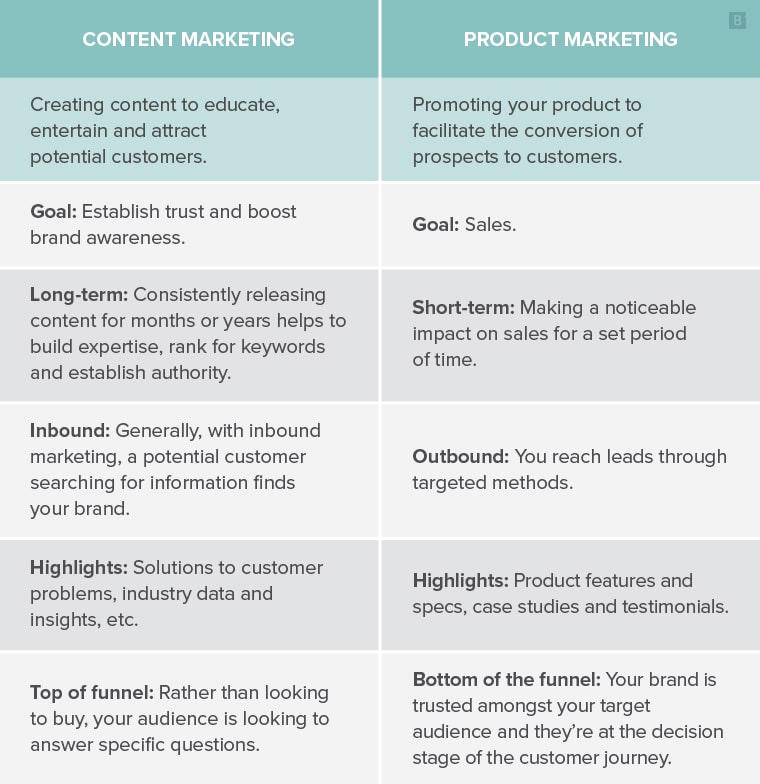
Image Source: Brafton
Are Product Marketing and Content Marketing at Odds?
Product marketing may have a slightly more direct goal than content marketing, but they don’t necessarily have to be at odds with each other. In fact, effective marketing integrates the two approaches. I believe that the best marketing strategies seek to serve the needs of customers at every stage of the buyer journey.
Buyers need both content marketing and product marketing to make the best decisions they can about solving their challenges.
As we all know, buyers are savvier now. They crave information, and they’ll learn about your products long before they speak to a salesperson. According to a study by Think With Google, 57% of the sales cycle is complete by the time buyers talk to your salesperson. Further, according to a study by Eccolo Media, nearly half of all buyers consume two to five pieces of content before making a purchase.
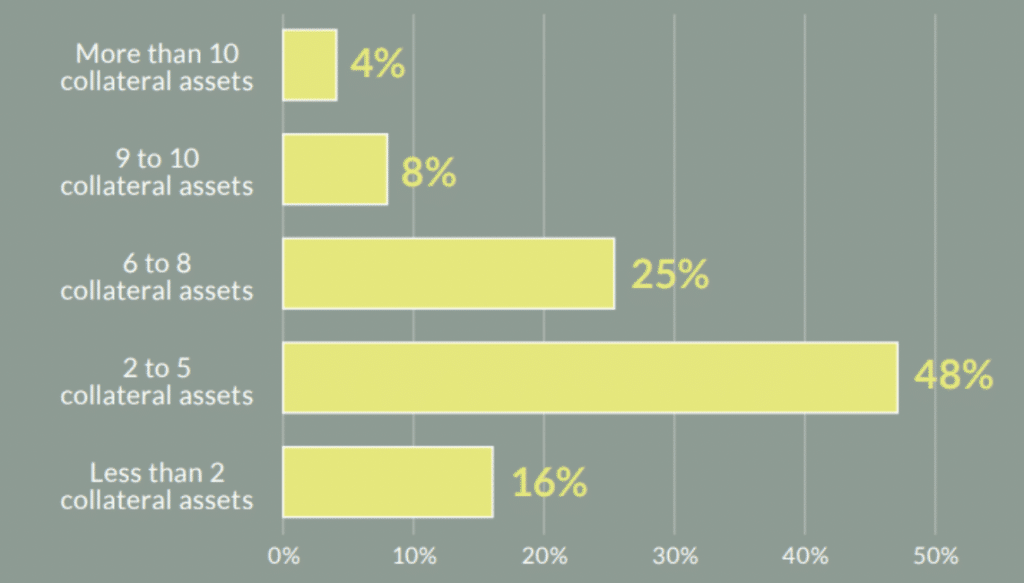
Image Source: Eccolo Media
Specifications and Features Can Be Part of Content Marketing
Every product that your brand launches will have desirable specifications and features. Rather than just focusing on these alone, content marketing can add context. That context would be in the form of defining how these specs and features provide benefits to users or remove pain points.
For example, in the manufacturing industry, facilities require a tremendous amount of equipment. That equipment serves as the lifeblood for their ability to improve throughput and meet quality standards. When they have a problem in an area of production, they are seeking answers. Yet these buyers may be very technical in nature and appreciate specs and features.
For this industry, content marketing and product marketing could work together to create assets that specify how the product works mechanically but also how it solves the problem and delivers benefits like better efficiency and reduced costs. That’s a message any buyer wants to hear. For other industries, priorities may vary:
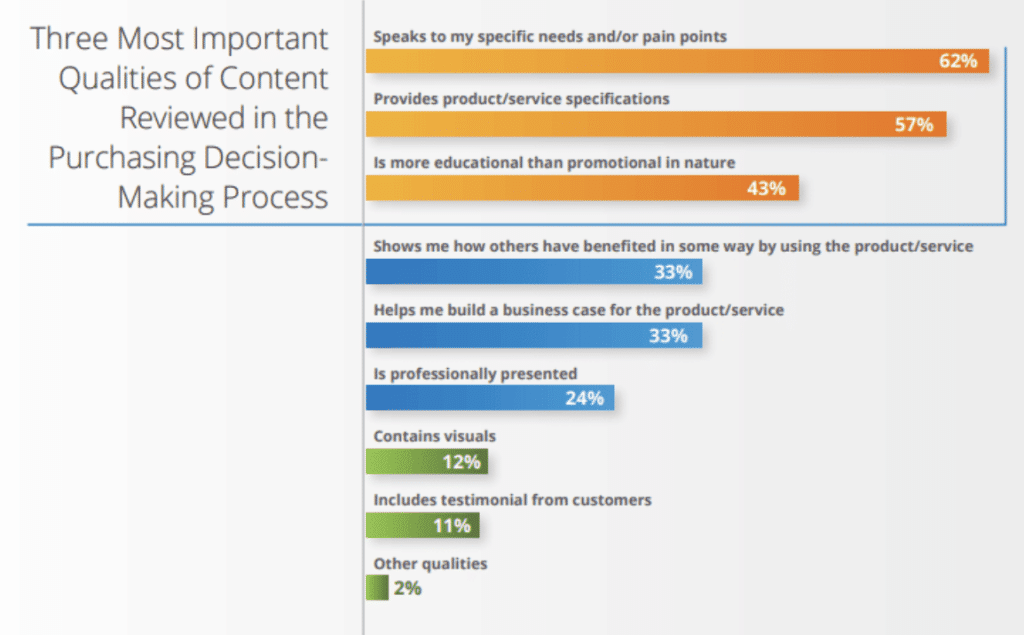
Image Source: Content Marketing Institute
Is Product Marketing Too Focused on Closing the Sale?
Many tactics used by product marketers focus on direct advertising that is focused on closing the sale, such as product sheets or spec diagrams. However, this type of content is only effective when the buyer is at the decision stage of the buyer’s journey. It’s not likely to make an impact when they are in the awareness stage because they are just becoming aware of their problem.
In these situations, product marketers should take a step back and consider how they can move someone down the funnel. And this often starts with content marketing techniques and storytelling.
Content marketing is, of course, concerned about the sale as well, but content marketers work up to that. Just as you probably wouldn’t propose on a first date, you can’t be too conversion-focused during your first interactions with a prospect.
Product Marketing Focuses More on Short-Term, Content Marketing Is a Long-Term Approach
Because product marketing uses tactics to get people to make a purchase, including coupon codes or special offers, these are usually short-term campaigns. They are filled with urgency and a desire to see a quick return on investment.
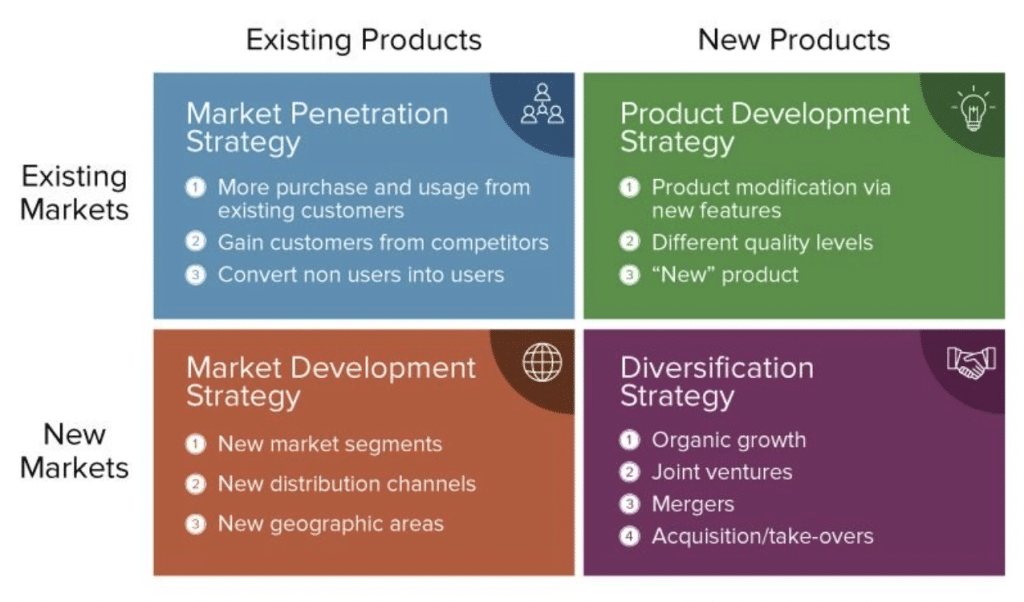
Image Source: SmartSheet
Content marketing is a long game. It’s a collection of tactics, including SEO, social media marketing, blogging, landing pages, and more, that work to set your brand up as a thought leader in the industry. With the approach of authentic content, buyers see your brand as trustworthy and likable. These sentiments go a long way toward developing prospects into customers. Content marketing certainly isn’t a quick win, but its performance can be measured.
By looking at the performance of certain efforts, you can learn what topics, formats, and channels deliver the best return. You’ll be able to steadily grow your audience and reputation.
But using content marketing doesn’t mean there isn’t a place for product marketing for quick wins. If you find specific channels wherein you know buyers are ready to make a purchase, use these to promote the product. Or let both areas of marketing work in tandem.
For example, you can post product-type marketing assets like a feature infographic to social media, then follow that up with a piece of long-form content that addresses how these innovative features solve real-world problems.
The Future of Marketing Is Customer Experience
Where product marketing and content marketing can have a meeting of the minds is in their focus on creating customer experiences that drive results for the brand. Both types of marketers want to understand their customers and what motivates them to buy. They want to be the solution to the problem.
They may go about this in slightly different ways, but this common ground of focusing on the customer is key to delivering a holistic marketing approach. No longer can brands be “me, me, me.” Most buyers want to work with brands that are empathetic, genuine, and dependable. And those brands that create assets, campaigns, and content based on their customers will find more success.
In the world of business, product marketing and content marketing are a match made in heaven. For brands to leverage both of these aspects of marketing, it requires being on the same page of educating, delighting, and engaging customers.
Content Marketing vs Product Marketing: What Wins?
The evolving marketing landscape highlights the importance of adaptability and integration. While the digital age has introduced new challenges, it also presents opportunities for brands to connect more deeply with their audience. By harmoniously blending the strengths of both content and product marketing, businesses can craft a comprehensive strategy that not only informs and sells, but also builds lasting relationships.
As marketers, our ultimate goal is to serve our customers’ needs, and by leveraging the combined power of these two approaches, we position ourselves to do just that. In the end, it’s about creating meaningful experiences that resonate, educate, and inspire loyalty.
Are you ready to create the ultimate content experience? Check out our SEO Blog Writing Service or schedule a quick consultation to learn more about how Marketing Insider Group can help you earn more traffic and leads for your business.






